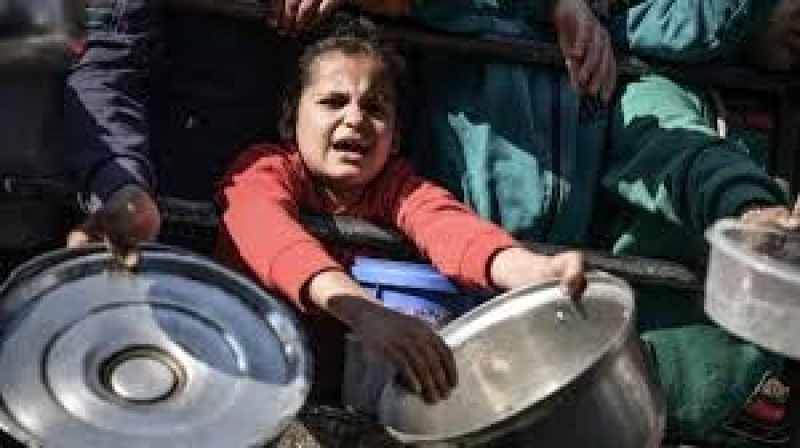- Power transfer, start of new journey for democracy: Prof Yunus |
- NCP Leaders Sign July National Charter in Dhaka |
- Tarique Rahman Vacates Bogura-6 Seat After Dual Win |
- Newly Elected MPs, Cabinet Members to Take Oath Tomorrow |
- India beats Pakistan by 61 runs as World Cup scenario heats up |
Gaza facing famine if fighting continues, UN says

The United Nations says Gaza is at risk of famine if the war between Israel and Hamas continues.
A quarter of households - roughly 500,000 people - are facing "catastrophic conditions", a UN food security agency found.
It says the territory's entire population of roughly 2.2m people is suffering acute food shortages.
"No-one in Gaza is safe from starvation," said Cindy McCain from the UN's World Food Programme (WFP).
"Humanitarian access is needed now for supplies to flow into and throughout Gaza, and for civilians to safely receive life-saving aid".
The report was published on Thursday by the Integrated Food Security Phase Classification (IPC), a UN body that assesses food security in places affected by conflict or natural disaster.
It states that the "quantities of commodities, including food, allowed to enter the Gaza Strip are largely insufficient".
Trucks have been bringing aid into Gaza from Egypt for weeks, but the WFP recently estimated that just 10% of the food needed is currently getting into the territory. On Wednesday a convoy carrying aid from Jordan crossed into Gaza via Israel for the first time since the start of the war.
Howaida Al-Daramali, a Palestinian woman who has been displaced to Khan Younis and who is also helping find shelter for other displaced families, said the limited aid being delivered "only goes to one or two places" and most people in Gaza were not receiving anything.
"We want this aid to be accompanied by teams who will be responsible for distributing it especially since the situation here is very difficult. Many people broke into the Red Crescent warehouses and looted them," she told the BBC.
Meanwhile some families who were getting aid because they were in UN-run shelters were selling what they did not need at inflated prices, Ms al-Daramali said.
"Even with cash, there are no goods in the supermarket and no suppliers. We can buy only from people who receive aid and sell it at the school gates, which are dangerous places for us to reach," she said.
People in Khan Younis were "psychologically and economically devastated", she said.
The UN Security Council is meanwhile trying to agree on a vote calling for more aid to get into Gaza. The vote has been delayed for several days over the wording of the text.
The US has expressed support for the latest draft resolution after earlier voicing "widespread concerns" with an earlier version that called for a ceasefire - something the US is against, saying it would only benefit Hamas.
The new draft aims to create a mechanism to accelerate aid but makes clear it would involve relevant parties such as Israel.
It also calls for all available routes to be used for deliveries but does not seek an immediate end to the fighting.
Linda Thomas-Greenfield, US Ambassador to the UN, described it as a "very strong resolution that is fully supported by the Arab group".
Meanwhile, the fighting in and around Gaza continues. Hamas authorities on Thursday accused Israel of attacking the Rafah crossing - killing four people, including the director of the recently reopened Kerem Shalom crossing. Israel's military has not commented on the reported incident.
Talks had been taking place in Egypt to reach a new truce - similar to the week-long pause in fighting last month that saw hostages released.
But on Thursday they suffered a setback when Hamas said it would not agree to a release of some hostages in exchange for a partial ceasefire.
It said Palestinian groups had rejected the prospect of more hostages being released until Israel agrees to end the war. Israel has repeatedly rejected a permanent ceasefire with Hamas, saying it aims to destroy the group.
More than 240 Israeli hostages were captured on 7 October when Hamas broke through the fortified perimeter with Israel, killing 1,200 people. A total of 110 hostages were released in the truce last month, reports BBC.
Earlier this week, Hamas said the number of people killed in Gaza in 10 weeks of fighting had passed 20,000.

